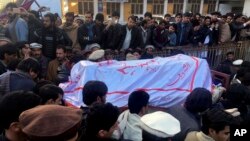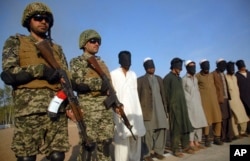The tribal region in northwest Pakistan has experienced an escalation in militant activities in the first quarter of 2017, a report by a Pakistani research center says.
FATA Research Center, a non-governmental group in Islamabad, reported a spike of 72 percent in activities by militants and Pakistani security forces in the semiautonomous tribal region, also called the Federally Administered Tribal Area (FATA) during the past three months.
According to the report, 119 violent attacks were documented from January to March as compared to 69 attacks in the last quarter of 2016.
Last year, Pakistan witnessed a considerable drop in terror attacks and violence. The country saw a 30 percent decline in militant attacks and a 28 percent decline in resultant deaths, according to statistics by the Pakistan Institute for Conflict and Security Studies.
The 38-page report released in recent days is based on data collected on terrorism and counterterrorism activities. It includes statistics on militant attacks as well as military counterterror measures by the government, including drone strikes and search operations in the tribal region.
Civilians have been a primary target of the surge in militant attacks, as 54 percent of the attacks were launched against the civilians in FATA, the report said.
“Between January-March 2017, a total of 57 terrorist attacks were carried out by various terrorist outfits, out of which 31 targeted civilians while 24 were aimed against security personnel,” the report said.
Counterterror operations on rise
The report also noted an increase in counterterrorism operations by the government, saying the “ratio of counterterrorism offensives remained high in comparison to the terrorist attacks” during the reporting period.
The Pakistani military launched a large-scale operation against militant groups in the tribal region in 2014. The operation displaced millions of people from the region.
According to the report, militant groups used improvised explosive devices (IEDs) to carry out most of the attacks, “On 27 occasions, terrorists opted for IED attacks, which accounts for around 47 percent of the total terrorist attacks during the quarter.”
Pakistan witnessed a series of suicide attacks following a Jamaat-ul-Ahrar, an offshoot of Tehreek-e-Taliban Pakistan (TTP), vow in February to target government interests.
“Jamaat-ul-Ahrar, the TTP offshoot, is responsible for this surge,” Irfan Uddin, a security expert report told VOA’s Urdu Service.
A roadside bomb on Tuesday killed at least 14 people and wounded nine others in the Kurram Agency of the tribal region.
A Pakistani Taliban-affiliate militant group took credit for the bombing, saying it was aimed at members of the minority Shi’ite Muslim community and government workers carrying out a census in the area.
Pakistan has come under frequent criticism from U.S. officials for its inability to curb homegrown militancy and extremism in the county.
Abdul Qayyum, a lawmaker and leader of the ruling Muslim League party, told VOA the government is aware of the surge in terrorism in FATA and is taking measures to stop it.






